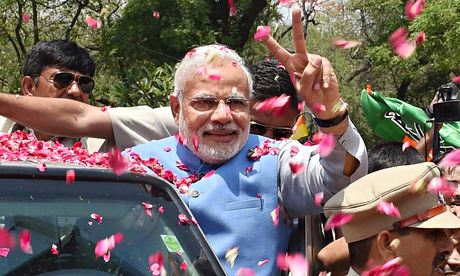
Narendra Modi is showered in petals as he greets supporters at his Bharatiya Janata Party’s headquarters in Delhi yesterday. Photograph: AP
Narendra Modi, the controversial Hindu nationalist who won a landslide victory in India's general election on Friday, made a triumphant entry to the capital, Delhi, on Saturday.
Tens of thousands of supporters welcomed the new prime minister, who until a few years ago was the little-known chief minister of the western state of Gujarat, but whose blending of nationalism with the promise of economic and cultural revival struck a chord with voters.
India is still reeling from the scale of Modi's win. Few predicted his conservative, pro-business Bharatiya Janata party, in opposition since 2004, would win 282 of the 543 directly elected seats in India's lower house. With existing allies, the total number of parliamentarians in the current BJP-led coalition rises to more than 340. No party has won by such a margin since 1984.
"The results were historic ... It is evident that the Indian voter has delivered an epochal verdict," wrote Anil Padmanabhan in Mint, a local business newspaper.
The centre-left Congress, which has governed India for all but 18 of the past 67 years, won only 44 seats, considerably lower than the most pessimistic of its own internal predictions and its worst performance. Rahul Gandhi, 43, scion of India's most famous political dynasty and the face of the party's campaign, accepted responsibility for the defeat at a press conference on Friday night.
Modi's plane arrived from Gujarat, where he was born and which he has run since 2001, at 11am and a motorcade of a dozen vehicles cruised along streets cleared by police from the airport to the BJP headquarters in the centre of the city. Roads for half a mile around the building had been closed and large numbers of security personnel deployed.
"Now we are in an absolute majority we are capable of doing anything," said Bala Das Sharma, 42, a homeopathic doctor from the nearby town of Ghaziabad, who had travelled to "salute the new prime minister".
Nikas Kumar, a bank employee in the booming satellite town of Gurgaon, and his wife Gitika, a human resources executive, had brought their daughter. "I wanted to feel a part of it, to be proud of it, to know that our vote counted," said Kumar, 39.
Modi, 63, a former tea seller whose background sets him apart from the established political and cultural elite of Delhi and was a major factor in his success, spoke briefly to party workers. "This victory belongs to you," he told them, before leaving for the holy city of Varanasi, one of the two seats from which he was elected, where he will offer prayers on the banks of the Ganges at sunset.
The huge win has raised concerns in some quarters in India and overseas. Most analysts had predicted the BJP would form a government with coalition partners from among India's powerful regional parties. These would have acted as a brake on any hardline agenda.
The new prime minister is a deeply polarising figure whom many Muslims in India – around 14% of the population – fear. Modi, the former organiser in the country's biggest Hindu revivalist organisation, has been accused of failing to stop, or even encouraging, sectarian riots in which 1,000 people, mostly Muslims, were killed in Gujarat shortly after he took power there. The violence followed an arson attack on a train full of Hindu pilgrims in which 59 died. Modi has always denied wrongdoing and a supreme court investigation found insufficient evidence to support the charges against him.
Modi, who has never held office at national level, pledged in his first speech after learning of the scale of his victory to fulfil the dreams of all of India's 1.25 billion people. "I want to take all of you with me to take this country forward ... it is my responsibility to take all of you with me to run this country," he said. He promised "to make the 21st century India's century".
International investors and local businessmen have welcomed the huge mandate for the BJP, which has promised to implement wide-ranging economic reforms. Though economic growth was strong through much of the decade of rule by Congress, it has faltered in recent years.
Modi made good governance and development the main focus of his campaign, deriding Gandhi as a "princeling" who had little concept of the aspirations of the 551 million people who voted in the bitter and protracted six-week contest.
Gandhi, whose mother, Sonia, led Congress to victory in 2004, fought a lacklustre campaign. Party officials sought to insulate the Nehru-Gandhi dynasty from criticism on Saturday. "It is not about the responsibility of one particular person or another," one said.
It is possible, though far from probable, that the crushing defeat will force the Congress into a radical restructuring to make the party more transparent, representative and responsive to voters.
For his part, Modi is likely to use his personal victory to lever out many old-guard figures within his own party who opposed his rise. Ravi Shankar Prasad, a senior BJP leader, said that the mood among officials was "as sober and sombre in victory as [it would have been] in defeat."
The BJP won more than 30% of votes cast, with Congress on 19%. Due to India's Westminster-style first past the post electoral system, some smaller parties did extremely well with tiny overall vote shares. About one voter in 100 used the None of the Above option, introduced for the first time in this poll.








0 comments:
Post a Comment